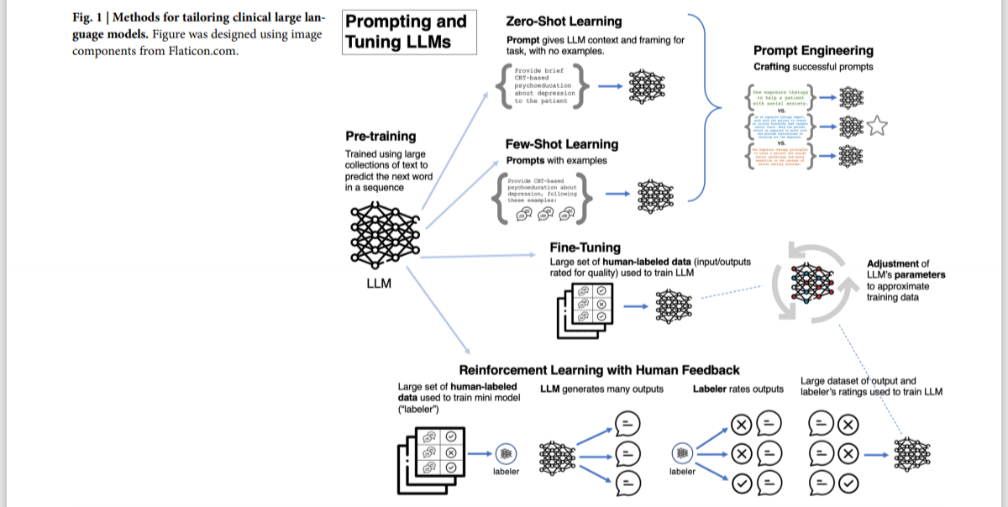The promise of clinical psychotherapy LLMs & Gen AI Apps to enhance Human Well-being.
Stephen Beller shared an aritcle from Stanford.
Here is a summary of the key opportunities and challenges in developing next-generation generative AI applications for human well-being, particularly in behavioral healthcare:
Opportunities:
1. Expanding access to mental healthcare by addressing insufficient system capacity and scaling personalized treatments.
2. Supporting, augmenting, or potentially automating aspects of psychotherapy.
3. Improving the quality, consistency, and scalability of therapeutic interventions and clinical research.
4. Facilitating large-scale studies of evidence-based interventions that could challenge assumptions about psychotherapy.
5. Enabling a precision medicine approach to behavioral healthcare by analyzing large datasets to determine optimal treatments.
6. Automating administrative tasks, measuring treatment fidelity, providing feedback on therapy homework, and assisting with supervision and training.
Challenges:
1. Ensuring responsible development and evaluation, given the high-stakes nature of clinical psychology applications.
2. Addressing the complex, nuanced expertise required for effective and safe therapy.
3. Balancing the potential benefits with risks such as privacy concerns, bias, and potential harm to vulnerable patients.
4. Developing systems that can adequately handle complex case conceptualization, consider social/cultural contexts, and address unpredictable human behavior.
5. Ensuring clinical LLMs can accurately detect risks (e.g., suicidal ideation) and handle ethical/legal requirements.
6. Maintaining transparency about AI use and fostering trust among patients and clinicians.
7. Navigating potential unintended consequences, such as changes to the structure of mental health services and clinician roles.
8. Addressing technical limitations like limited context windows in current LLMs.
9. Evaluating whether fully autonomous AI systems can safely deliver psychotherapy without human oversight.
10. Facilitating interdisciplinary collaboration between clinical scientists, engineers, and technologists to develop effective and ethical applications.
The article emphasizes the need for a cautious, phased approach to integrating LLMs into behavioral healthcare, with a focus on evidence-based practices, rigorous evaluation, and prioritizing clinical improvement over mere engagement. It also highlights the potential for these technologies to advance clinical science and practice in unprecedented ways if developed responsibly.
"Computational Psychiatry" is getting a lot of attention these days, and is even the focus of the NIMH grant opportunity. In a similar way, our models and tools refer to "Computational Psychotherapy," which is a very new field with only 1 unique Google Search link.
However, another link was to Stanford U's Computational Psychology & Well-Being Lab (I never heard of that dept.). An article published on that website is focused exactly on what we need to build our next-generation apps -- https://static1.squarespace.com/static/53d29678e4b04e06965e9423/t/6622c944429f373d5feeda85/1713555781744/LLMs+in+mental+health+MHR.pdf The article is excellent for anyone on our team involved with AI and LLMs supporting mental/behavioral health and a worthy read. Otherwise, here's a summary:
The article highlights several key areas:
1. Applications in Psychotherapy: LLMs are being used as conversational agents to support mental healthcare by assisting with tasks such as note-taking during sessions, evaluating patient emotions, and even delivering certain therapeutic interventions.
2. Challenges and Concerns: Despite their potential, the use of LLMs in this sensitive field raises significant ethical, legal, and safety concerns, particularly around the handling of sensitive topics like suicide risk. The complexity of psychotherapy requires nuanced human expertise that LLMs currently may not fully replicate.
3. Development and Evaluation Frameworks: The article proposes frameworks for evaluating the readiness of LLMs for clinical deployment, focusing on safety, effectiveness, and ethical considerations to ensure that these technologies are integrated responsibly into healthcare settings.
4. Potential for Enhanced Access and Efficiency: LLMs could significantly increase access to mental health resources, offering scalable solutions like mental health education, predictive analytics for diagnosing mental health conditions, and personalized care plans based on individual patient data.
5. Privacy and Data Security: With the use of AI in healthcare, there is an urgent need to address data privacy and security, ensuring that patient data is handled with the highest standards of confidentiality.
6. Stakeholder Involvement: The importance of involving a wide range of stakeholders, including those with lived experiences of mental health issues, in the development and deployment phases of LLMs is emphasized to ensure the technologies meet actual needs and are used ethically.
7. The enthusiasm for LLMs in mental health care is balanced with a call for cautious and well-regulated integration, underlining the need for ongoing research, stakeholder engagement, and development of best practices.






Comments
Post a Comment